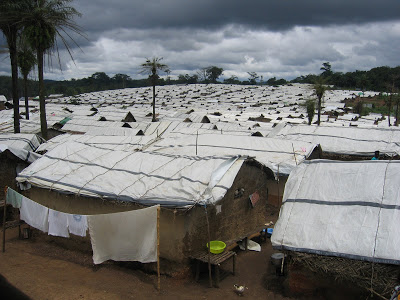“You are a UN Humanitarian Aid worker who has recently been sent to Liberia to provide aid to women, men and children in surrounding IDP camps…What steps do you think the UN must take to ensure the safety, health and well-being of these communities. What information must be recorded and why? What services must be delivered, and how?”
It is imperative that as a UN aid worker, I realize that I cannot impose my ideals on the Liberian people and that I understand the reasons and effects of the internal armed conflict they experienced. As fellow blogger Christine Galotti stated a “transnational” approach is needed to serve the Liberians. This can be achieved responsibly and effectively by the United Nations in establishing a relationship with community leaders and hear the grievances of Liberians. Many camps that hold internally displaced populations (IDP) face adverse effects of war as there are no social service infrastructures such as health clinics, schools, water filtration systems, etc. that can allow the community to sustain itself. The first step is to ensure the health needs and security of IDP’s.
In the post-war period, the violence does not end once arms are laid down. The effects of war are numerous and effect women, men and children differently. From Ashford’s The Impact of War on Women, women are disproportionately affected by war experiencing “violence, rape and extortion in camps” (197). Liberian women suffered and survived the abuses and human rights violations committed by the anti-terrorist unit of Charles Taylor as well as the insurgency group, the Liberians United for Reconciliation and Democracy (LURD). It is important to accommodate the current President of Liberia, Ellen Johnsons Sirleafs’ plan to investigate human rights abuses and tend to the people who have survived the war. These reports can encourage the international community, particularly Nigeria, Sierra Leone and other countries involved in ousting Charles Taylor to create a case for the injustices that he has committed.
The expansive issue of rape committed during the internal conflict in Liberia would also require UN forces to perform medical check-ups for the IDP’s and screen them for sexually transmitted diseases. Raised in a blog by the Women’s Media Center (WMC), UN aid workers and peacekeepers are not trained on how to stop sexual violence, which causes many of them to avoid reporting it. Patrick Cammerat, former commander of the UN in the Democratic Republic of Congo has begun the first steps in training UN workers to search for signs to prevent rape as well as not evade it. He feels exposure to the topic can enable UN workers to intervene, stop and/or prevent sexual violence. Building health clinics would ensure that the IDP residents would have medical attention when facing dehydration, diarrhea, vomiting, malnutrition, fevers and other health risks that could become deadly if not treated. Access to safe water, proper shelter, sanitation and food distribution are also steps needed to be taken to ensure the health of IDP’s.
In a segment of the film Pray the Devil Back to Hell, I remember the Women’s Liberation Movement went to the areas in which disarmament was taking place and acted as a monitoring agency for the process. One woman activist in particular mentioned that Liberia had in the past both successful and unsuccessful experiences with disarmament and therefore they knew what worked in their country and what did not. However, the UN peacekeeping forces dismissed their presence and expertise by emphasizing their authority in the process by stating that they were the professionals. To dismiss local guidance in a peacemaking process requires that an agency like the UN work with the people of Liberia, especially prominent members in the community that organized resistance towards Ex-President Charles Taylor.
The steps that are required to serve IDP camps effectively are expansive. It extends from taking care of the physical well-being of people to ensuring their security and stability. As a UN humanitarian aid worker, it is a difficult job to pursue and fulfill. International aid offers assistance to IDP camps in need; it unfortunately does not offer panaceas to the many issues that exist in these camps but I believe it exists to promote hope, activism and empowerment to these communities.
